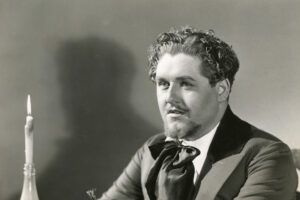

Wait, let’s start over.
I remember the exact moment, more or less, when I understood that audiences will laugh at almost anything. It was the revival of Glenngarry Glen Ross with Liev Schreiber, and the audience laughed after literally every line. Glenngarry Glen Ross is not a comedy.
I found myself thinking of this during the scene between Rodolfo (or Carlo or George Glass or whatever he’s calling himself these days) and Federica in Act I of San Francisco Opera’s season-opening Luisa Miller. In certain theatrical moments, it seemed to me, where the emotional content is not experience-near for most audiences, it is the job of the director to keep audiences from laughing at tragedy.
Now, let us bear in mind that the director is only part of the equation. Unlike Don Carlo or Maria Stuarda, Luisa Miller is one of those translations that takes the stately dramatic bones of a Schiller play and filets them. Worse, Ekaterina Semenchuk, who would shortly go on to do some poised and sonically rich singing had not yet hit her stride and wasn’t making much of an effect.

I have of course seen interesting productions by Francesca Zambello, a prolific and seasoned director. This revival, stage directed by Laurie Feldman, was not among them. Michael Yeargan always creates a beautiful stage but if anyone can guess why he was asked to design the giant square panel that slid about on an industrial-looking track, I’d be eager to know.
The bigger problem, though, was that nobody refined the sometimes overeager physicality of the singers. The tragic denoument recalled, in certain ways, a late scene between Andie MacDowell and Bruce Willis in Hudson Hawk, I’m sorry but also delighted to say.
Happily, none of this mattered a great deal. If it had only been for Leah Crocetto’s Luisa—is it Passover already?—it would have been enough. Crocetto is the kind of singer who will never depend much on the production around her, because the voice is just that lovely. If her singing is not always overtly emotive, neither is it dull.

She might have walked off with the show had it not been for Michael Fabiano, whose star continues to rise. Though his diction remains spotless and his commitment unflagging, the notable thing about this performance was the range. Fabiano seemed equally comfortable lavishing the phrase “puro amor” with a little old school crooning and blowing the roof off the house in the Act I confrontation with Walter (Daniel Sumegi, making expert and deeply musical use of the roughness that now encrusts his substantial voice.) “Quando le sere” was bliss, in the finest Verdian style.
Andrea Silvestrelli as Wurm and Vitaly Bilyy as Miller ably rounded out the cast. Bilyy was a pre-season replacement for Thomas Hampson, who sensibly dropped the role, and probably a better fit. His declamation struck me as a touch under-specified, but the house loved him. Nicola Luisotti served up a strong, dramatically pointed reading of the score and a singer-friendly one, at that.
At the end of the evening, David Gockley presented the San Francisco Opera Medal, recently awarded to Susan Graham, to Zambello in what it was hard not to read as a bellwether with regard to the company’s upcoming succession. “Great bling!” Zambello quipped, upon being thusly festooned or, perhaps, anointed.
Photos ©Cory Weaver/San Francisco Opera.


























Comments